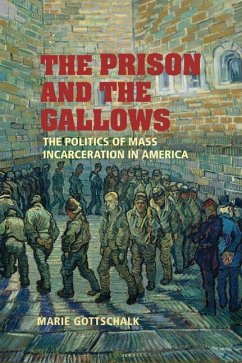This book argues that punitive penal policies were forged by particular social movements.
Over the last three decades the United States has built a carceral state that is unprecedented among Western countries and in US history. Nearly one in 50 people, excluding children and the elderly, is incarcerated today, a rate unsurpassed anywhere else in the world. What are some of the main political forces that explain this unprecedented reliance on mass imprisonment? Throughout American history, crime and punishment have been central features of American political development. This book examines the development of four key movements that mediated the construction of the carceral state in important ways: the victims' movement, the women's movement, the prisoners' rights movement, and opponents of the death penalty. This book argues that punitive penal policies were forged by particular social movements and interest groups within the constraints of larger institutional structures and historical developments that distinguish the United States from other Western countries.
Review quote:
"The Prison and the Gallows brings politics (both the state and organized interests) back into a discussion that has been preoccupied with society (modernity) and with social structures (race and the economy). Gottschalk does not, however, tell a politician or partisanship story, the longstanding familiar one of “running on crime” and submitting to the pressures of electoral realignment. Rather her extraordinarily original and paradoxical “story” is the much more challenging one – about the very most reformist movements in society that might have, but did not, resist or redirect carceral expansion. This is an exquisitely-written book and one which meets the highest standards of academic scholarship." --Mary Fainsod Katzenstein, Cornell University
"The Prison and the Gallows provides important insight into the perplexing question of how the United States came to embark upon a policy of mass incarceration over the past several decades. Marie Gottschalk documents how a particular set of political and historical conditions intersected with the agendas of both liberal and conservative interest groups to produce an outcome that is unique by world standards. Her analysis suggests that these developments were not inevitable, an important lesson to understand if we are to develop strategies for reversing these disastrous policies." -- Marc Mauer, Executive Director, The Sentencing Project; author, Race to Incarcerate
"One of the most important books I've read in years. Marie Gottschalk shows --in vivid and mournful detail-- how Americans lock one another up at unprecedented rates. The Prison and the Gallows provides the big picture, analytic nuance, historical context, comparative evidence, policy proposals, and a touch of outrage. Splendid scholarship presented with flair and passion." -- James Morone, author, Hellfire Nation: The Politics of Sin in American History
Table of contents:
1. The prison and the gallows: the construction of the carceral state in America; 2. Law, order, and alternative explanations; 3. Unlocking the past: the nationalization and politicization of law and order; 4. The carceral state and the welfare state: the comparative politics of victims; 5. Not the usual suspects: feminists, women's groups, and the anti-rape movement; 6. The battered women's movement and the development of penal policy; 7. From rights to revolution: prison activism and penal policy; 8. Capital punishment, the courts, and the early origins of the carceral state, 1920s-1960s; 9. The power to punish: the political development of capital punishment, 1972 to today; 10. Conclusion: whither the carceral state.
Hinweis: Dieser Artikel kann nur an eine deutsche Lieferadresse ausgeliefert werden.
Over the last three decades the United States has built a carceral state that is unprecedented among Western countries and in US history. Nearly one in 50 people, excluding children and the elderly, is incarcerated today, a rate unsurpassed anywhere else in the world. What are some of the main political forces that explain this unprecedented reliance on mass imprisonment? Throughout American history, crime and punishment have been central features of American political development. This book examines the development of four key movements that mediated the construction of the carceral state in important ways: the victims' movement, the women's movement, the prisoners' rights movement, and opponents of the death penalty. This book argues that punitive penal policies were forged by particular social movements and interest groups within the constraints of larger institutional structures and historical developments that distinguish the United States from other Western countries.
Review quote:
"The Prison and the Gallows brings politics (both the state and organized interests) back into a discussion that has been preoccupied with society (modernity) and with social structures (race and the economy). Gottschalk does not, however, tell a politician or partisanship story, the longstanding familiar one of “running on crime” and submitting to the pressures of electoral realignment. Rather her extraordinarily original and paradoxical “story” is the much more challenging one – about the very most reformist movements in society that might have, but did not, resist or redirect carceral expansion. This is an exquisitely-written book and one which meets the highest standards of academic scholarship." --Mary Fainsod Katzenstein, Cornell University
"The Prison and the Gallows provides important insight into the perplexing question of how the United States came to embark upon a policy of mass incarceration over the past several decades. Marie Gottschalk documents how a particular set of political and historical conditions intersected with the agendas of both liberal and conservative interest groups to produce an outcome that is unique by world standards. Her analysis suggests that these developments were not inevitable, an important lesson to understand if we are to develop strategies for reversing these disastrous policies." -- Marc Mauer, Executive Director, The Sentencing Project; author, Race to Incarcerate
"One of the most important books I've read in years. Marie Gottschalk shows --in vivid and mournful detail-- how Americans lock one another up at unprecedented rates. The Prison and the Gallows provides the big picture, analytic nuance, historical context, comparative evidence, policy proposals, and a touch of outrage. Splendid scholarship presented with flair and passion." -- James Morone, author, Hellfire Nation: The Politics of Sin in American History
Table of contents:
1. The prison and the gallows: the construction of the carceral state in America; 2. Law, order, and alternative explanations; 3. Unlocking the past: the nationalization and politicization of law and order; 4. The carceral state and the welfare state: the comparative politics of victims; 5. Not the usual suspects: feminists, women's groups, and the anti-rape movement; 6. The battered women's movement and the development of penal policy; 7. From rights to revolution: prison activism and penal policy; 8. Capital punishment, the courts, and the early origins of the carceral state, 1920s-1960s; 9. The power to punish: the political development of capital punishment, 1972 to today; 10. Conclusion: whither the carceral state.
Hinweis: Dieser Artikel kann nur an eine deutsche Lieferadresse ausgeliefert werden.








